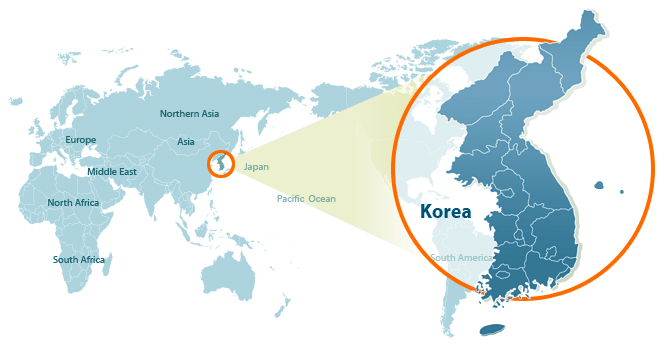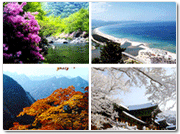|
|
 Home > General Information > About Korea Home > General Information > About Korea |
 |
KOREA |
 |
The Republic Of Korea is a small country on the far eastern edge of Asia. Although it ranks 109th in the world in terms of land area, the country is a center of economic activity, culture, and arts. Korea was colonized by Japan in the early 20th century and later had to endure the Korean War (1950-53), but it has achieved amazing economic growth in a short period, dubbed "the Miracle on the Han River."
Today, Korea is an industrial nation standing tall on the world stage. Its semiconductor, automobile, shipbuilding, steel making, and IT industries are on the leading edge in global markets. It hosted the 1988 Seoul Olympics and the 2002 Korea-Japan FIFA World Cup. More recently, Korean dramas, movies, and music are attracting many audiences in Asian countries and beyond, creating what is being called the "Korean Wave." Korea's new standing in the international community was highlighted in 2010 with the nation becoming the first Asian country to chair the G20 and host the G20 Seoul Summit. |
 |
Climate |
 |
The Republic of Korea lies between 38ºN and 33ºN latitude and 126ºE to 132ºE longitude. The country has a continental climate of very cold, dry winters and very hot, humid summers. Winters are influenced by westerly winds from Siberia and the Mongolian plateau, while summers are generally characterized by an oceanic climate due to moist, warm winds from the Pacific Ocean. Korea has four distinct seasons, though spring and autumn tend to be short. Spring comes in early April and lasts throughout May. The hot and humid summer begins in June and lasts about four months. |
The summer rainy season lasts from the end of June to mid July. Summer ends in late September, giving way to crisp, clear autumn days that last until the end of October. It becomes colder in November, and a very cold, bleak winter sets in during December and lasts until the end of February. |
| ISR 2013 |
| Month |
Jan. |
Feb. |
Mar. |
Apr. |
May. |
Jun. |
Jul. |
Aug. |
Sep. |
Oct. |
Nov. |
Dec. |
| Temperature |
-2 |
-2 |
5 |
12 |
17 |
22 |
26 |
28 |
21 |
10 |
5 |
-4 |
 |
Korean |
Hangeul was invented in 1443, during the reign of King Sejong. It is composed of 10 vowels and 14 consonants. Hangeul has 11 compound vowels, 5 glottal sounds. The chart below represents the 24 Hangeul letters and their romanized equivalents. 'The Hunminjeongeum,' a historical document which provides instructions to educate people using Hangeul, is registered with UNESCO. UNESCO awards a 'King Sejong Literacy Prize, ' every year in memory of the inventor of Hangeul. |
| English |
Korean |
Korean Pronunciation |
| How are you? |
안녕하세요? |
Aan-nyeong-haseyo? |
| Thank you. |
감사합니다. |
Gamsa-haam-nida. |
| Yes. |
예. |
Ye. |
| No. |
아니요. |
Aniyo. |
| I am sorry. |
미안합니다. |
Meean-hamnida. |
| I enjoyed the meal. |
잘 먹었습니다. |
Jal mugut-sum-nida. |
| Please give me some more of this. |
이것 더 주세요. |
Yigut du juseyo. |
| The check, please. |
계산서 주세요. |
Gye-saanseo juseyo. |
| Do you take credit cards? |
카드로 계산할 수 있습니까? |
Card-ro gyesaan halsu yisum-neeka? |
| How much is it? |
얼마입니까? |
Ulma-eem-neeka? |
| It is ________ won. |
_________ 원 입니다. |
_________ won eem-needa. |
| 5,000 |
오천 |
O-cheon |
| 10,000 |
만 |
Maan |
| 15,000 |
만오천 |
Maan-o-cheon |
| 20,000 |
이만 |
Yi-maan |
| 30,000 |
삼만 |
Saam-maan |
| Where is the restroom ? |
화장실 어디입니까? |
Hwa-jangsil udee-eem-nee ka?? |
| Goodbye. |
안녕히 계세요. |
Aan-nyeonghee gyeseyo |
|
|
 |
|
|


